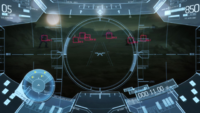HRUNTING/YGGDRASIL Mark I ADS: Difference between revisions
From Halopedia, the Halo wiki
KaragouniS (talk | contribs) |
KaragouniS (talk | contribs) |
||
| Line 62: | Line 62: | ||
*T261 Lucifer AMGG (Arm-Mounted Gatling Gun) with 20mm high explosive rounds, alternate-hand grip stabilizer. | *T261 Lucifer AMGG (Arm-Mounted Gatling Gun) with 20mm high explosive rounds, alternate-hand grip stabilizer. | ||
*Type 18 Magnetic/Bayonet-style Claymore which can be primed, attached, or otherwise impaled into nonmagnetic surfaces | *Type 18 Magnetic/Bayonet-style Claymore which can be primed, attached, or otherwise impaled into nonmagnetic surfaces | ||
*Motion Sensor with 1400m+ range (with map mode) across flat surfaces with minimal destruction | *[[Motion Sensor]] with 1400m+ range (with map mode) across flat surfaces with minimal destruction | ||
*2x Ventral VTOL Stabilizers | *2x Ventral VTOL Stabilizers | ||
*2x Dorsal VTOL Stabilizer | *2x Dorsal VTOL Stabilizer | ||
Revision as of 05:05, April 25, 2010
Template:Ratings Template:Ship The HRUNTING/YGGDRASIL Mark I Prototype Exoskeleton[1] was an experimental bipedal exoskeleton developed by the UNSC Marine Corps in Weapons Research Facility T12A on Algolis.
Overview
The armor was an earlier version of the MJOLNIR Powered Assault Armor, designed for use by the SPARTAN-IIs. However, despite its effectiveness, the idea was mainly scrapped, as the user was very vulnerable and it was too complicated for use on the limited number of Spartan-IIs.[2] The prototype of this Exoskeleton suit was destroyed, along with all of its data due to the enactment of the Cole Protocol during the Battle of Algolis. [3]
Features
Unlike the more advanced MJOLNIR system, the user does not need to be augmented to wear the armor. Though the HUD seems similar to the MJOLNIR configuration, the suit's integrated weapon system and improved target assessment bypass the need for a neural interface link. The suit uses simple Laser and radio for communications, doesn't recycle fluids, and is loaded out with pre-existing weaponry, making it overall cheaper to build than the MJOLNIR.[4]
Armaments
The main strength of the suit lies in the myriad of weapon systems it boasts, each integrated directly into the infrastructure of the exoskeleton. The right arm ends in an 850-round, six-barreled heavy machine gun with the barrel of an as-of-yet unidentified weapon mounted on top of that. The right shoulder is topped with a tri-barreled missile launcher armed with heat-seeking missiles that operate and appear identical to those fired by the LAU-65D/SGM-151. On the other side of the exoskeleton, a 60mm High Velocity Cannon is mounted on the left shoulder and requires the operator to manually aim it for accuracy. The suit comes loaded with fifty of these 60mm rounds, each with a blast radius comparable to a five meter spread. The suit's left arm ends in a mechanical hand used to both operate weapons and manipulate external objects with ease. Two missile tubes are attached to the forearm and are packed with identical missiles as the shoulder-mounted weapon.
To complete the complement, three cylindrical explosives are attached to each thigh, each with enough power to completely engulf a Wraith tank in flames.

Equipment
The suit makes use of a number of high-tech innovations to operate efficiently. One of these improvements is a type of jetpack used for powered flight. Directional control seems to be provided by shifts in balance by the operator. When not in use, the pack's thrusters fold into slots in the suit to protect from external damage. Another useful addition is the incorporation of the core technology behind ONI's reverse-engineered Bubble Shields. This shield automatically engages when the suit comes under fire.
List of components
This exoskeleton is based on titanium alloy plating and nanocomposite titanium microfiber
- Dynamic Local Dissipative Shield Technology
- T261 Lucifer AMGG (Arm-Mounted Gatling Gun) with 20mm high explosive rounds, alternate-hand grip stabilizer.
- Type 18 Magnetic/Bayonet-style Claymore which can be primed, attached, or otherwise impaled into nonmagnetic surfaces
- Motion Sensor with 1400m+ range (with map mode) across flat surfaces with minimal destruction
- 2x Ventral VTOL Stabilizers
- 2x Dorsal VTOL Stabilizer
- 4x Afterburner Thrusters
- LAU-1810/SGM-151 Shoulder-mounted, self guided high explosive missiles
- M149 Magellan RCL - Armor mounted recoilless rifle with 105mm high explosive ordnance
- It was also rumored to have an 300 MT led-tampered nuclear fission self-destruct sequence component (in compliance with Cole Protocol and Winter Contigence), which would reuse the fusion components of the suit's power system and begins a staggered countdown which could only be activated with a voice command.[5]
Trivia
- The shoulder-plate verniers on the Prototype Powered Exoskeleton are identical to the shoulder-plate devices on the MSN-03 Jaga Doga from the famous Japanese mecha anime, Mobile Suit Gundam "Char's counterattack", sans the Funnels on the latter. The color is even a perfect match to the colors on Gyunei Guss's customized version. It also bears a resemblance to the Mobile Suit Gundam Seed variation Duel Dagger.
Sources
- ^ Halo Waypoint, Coming Up on Waypoint, accessed on Sunday 18/4/2010
- ^ Halo Legends: Prototype DVD Commentary
- ^ Halo Legends, Prototype
- ^ Halo.bungie.org: Re: End of Prototype *Legends spoils*
- '^ Halo Waypoint article Prototype, Sunday April 25, 2010